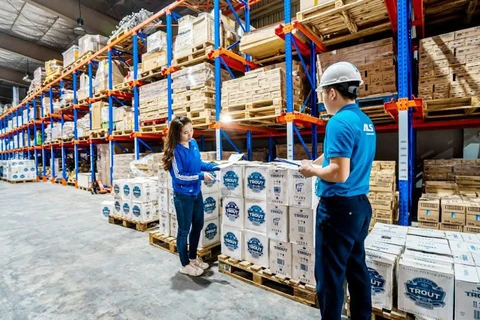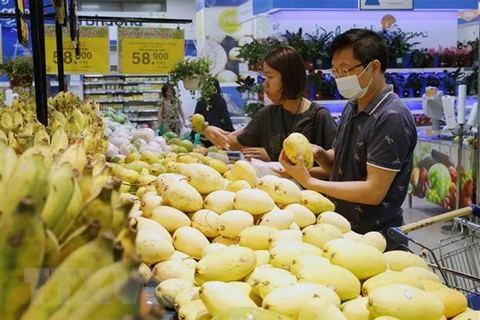Hanoi (VNS/VNA) - Hanoi would continue to hasten administrative reforms and apply measures to improve competitiveness of local enterprises and producers to expand exports.
The point was highlighted in Plan 257/KH-UBND on strengthening exports of the capital city in 2024 issued in late October.
Accordingly, the capital city aims for exports in 2024 to grow by 5% over 2023.
In the plan, the city pointed out challenges for exports from rising global uncertainties.
“The economic recession risk together with high inflation pressure are causing consumer demand to decline sharply around the world, including Europe and America which are major trade partners of Vietnam,” the plan said.
Energy and food crises as well as disruptions in supply chains and rising material prices were still ongoing. Besides, green economy development was bringing both opportunities and challenges to Vietnam’s exports as developed economies may erect technical barriers.
However, addressing advantages from Vietnam’s stable macro-economy and the Government’s firm solutions to promote production and business, Hanoi said it would focus on devising measures to enhance competitiveness of local enterprises and producers, to be able to best adapt to the new circumstances.
Under the plan, the capital city would strengthen administrative reforms with the focus on promoting the application of information and technology in processing administrative procedures, including tax, customs and certification of origin, to facilitate exports.
In addition, mechanisms and policies would be raised to promote production and exports, especially credit policies, together with solutions to improve the quality of human resources meeting demand of enterprises.
The city would increase the investment attraction in infrastructure and logistics services to facilitate exports, and improve the efficiency of trade promotion programmes.
A recent study on promoting goods export of enterprises in Hanoi by Bui Thi Hoang Lan from the National Economics University suggested the capital city restructure the industrial sector in association with digital transformation to create a new driver for breakthrough export growth.
The capital city should hasten the transition of export goods structure towards increasing added value and quality and establish value chains.
Pointing out that Hanoi lacked foreign capital influx, which was large enough to create breakthroughs to production and export, Lan said that the capital city needed to raise policies to attract more foreign capital.
Besides, improving the competitiveness of enterprises and producers in the city played a very important role in expanding exports. The focus would be on implementing regular training courses to enhance knowledge and skills in product design, brand building, international integration, technical barriers in international trade, new policies, and market updates.
Lan also said that it was important to develop centres of raw materials for the production of export goods, and improve infrastructure of industrial parks to attract more investments in production.
Addressing problems from poor infrastructure, which caused rising logistics costs and undermined the competitiveness of enterprises, Lan suggested Hanoi increase the attraction of investment in logistics infrastructure with the priorities in the systems to connect with other provinces in the Northern key economic region.
Incentives in land policies should be given to the development of logistics centres towards the formation of a logistics market, which would help increase budget revenue, reduce inner-city traffic congestion and remove barriers to goods circulation and exports.
She also proposed policies be raised to attract investment in the development of large-scale “logistics villages” – a completely new business model to facilitate exports.
The latest updates of the municipal Department of Statistics showed that the city reported a trade value of more than 5 billion USD in October, representing a rise of 2.1% against the previous month and 10.1% against the same period last year.
Of the figure, export revenue was estimated at 1.45 billion USD, a year-on-year increase of 7.6%.
For January – October, the city’s total export value reached 13.8 billion USD, a slight drop of 1.4% against the same period of 2022 on falling global consumption demand.
Hanoi reported a total export value of 17.1 billion USD in 2022, a year-on-year increase of 10.6% exceeding the target of 5%, ranking the capital city 8th out of 63 provinces and cities in terms of export revenues.
The export value of the domestic economic sector was 9.181 billion USD, higher than the export value of the foreign–invested sector which was at 7.9 billion USD. This was a spotlight of Hanoi’s export in the context that the country’s export remained dependent of foreign–invested enterprises.
Major export products of Hanoi included garments, computers and electronic components, machinery and components, timber and wooden products, and agricultural products.
In the 2017-2023 period, the city’s export revenue expanded on average 8.2% per year, except for 2020, which saw a drop of 3.4% due to the impact of the COVID-19 pandemic.
According to Hanoi Statistics Department, there were more than 2,500 enterprises in the capital city involved in exporting in 2022./.
The point was highlighted in Plan 257/KH-UBND on strengthening exports of the capital city in 2024 issued in late October.
Accordingly, the capital city aims for exports in 2024 to grow by 5% over 2023.
In the plan, the city pointed out challenges for exports from rising global uncertainties.
“The economic recession risk together with high inflation pressure are causing consumer demand to decline sharply around the world, including Europe and America which are major trade partners of Vietnam,” the plan said.
Energy and food crises as well as disruptions in supply chains and rising material prices were still ongoing. Besides, green economy development was bringing both opportunities and challenges to Vietnam’s exports as developed economies may erect technical barriers.
However, addressing advantages from Vietnam’s stable macro-economy and the Government’s firm solutions to promote production and business, Hanoi said it would focus on devising measures to enhance competitiveness of local enterprises and producers, to be able to best adapt to the new circumstances.
Under the plan, the capital city would strengthen administrative reforms with the focus on promoting the application of information and technology in processing administrative procedures, including tax, customs and certification of origin, to facilitate exports.
In addition, mechanisms and policies would be raised to promote production and exports, especially credit policies, together with solutions to improve the quality of human resources meeting demand of enterprises.
The city would increase the investment attraction in infrastructure and logistics services to facilitate exports, and improve the efficiency of trade promotion programmes.
A recent study on promoting goods export of enterprises in Hanoi by Bui Thi Hoang Lan from the National Economics University suggested the capital city restructure the industrial sector in association with digital transformation to create a new driver for breakthrough export growth.
The capital city should hasten the transition of export goods structure towards increasing added value and quality and establish value chains.
Pointing out that Hanoi lacked foreign capital influx, which was large enough to create breakthroughs to production and export, Lan said that the capital city needed to raise policies to attract more foreign capital.
Besides, improving the competitiveness of enterprises and producers in the city played a very important role in expanding exports. The focus would be on implementing regular training courses to enhance knowledge and skills in product design, brand building, international integration, technical barriers in international trade, new policies, and market updates.
Lan also said that it was important to develop centres of raw materials for the production of export goods, and improve infrastructure of industrial parks to attract more investments in production.
Addressing problems from poor infrastructure, which caused rising logistics costs and undermined the competitiveness of enterprises, Lan suggested Hanoi increase the attraction of investment in logistics infrastructure with the priorities in the systems to connect with other provinces in the Northern key economic region.
Incentives in land policies should be given to the development of logistics centres towards the formation of a logistics market, which would help increase budget revenue, reduce inner-city traffic congestion and remove barriers to goods circulation and exports.
She also proposed policies be raised to attract investment in the development of large-scale “logistics villages” – a completely new business model to facilitate exports.
The latest updates of the municipal Department of Statistics showed that the city reported a trade value of more than 5 billion USD in October, representing a rise of 2.1% against the previous month and 10.1% against the same period last year.
Of the figure, export revenue was estimated at 1.45 billion USD, a year-on-year increase of 7.6%.
For January – October, the city’s total export value reached 13.8 billion USD, a slight drop of 1.4% against the same period of 2022 on falling global consumption demand.
Hanoi reported a total export value of 17.1 billion USD in 2022, a year-on-year increase of 10.6% exceeding the target of 5%, ranking the capital city 8th out of 63 provinces and cities in terms of export revenues.
The export value of the domestic economic sector was 9.181 billion USD, higher than the export value of the foreign–invested sector which was at 7.9 billion USD. This was a spotlight of Hanoi’s export in the context that the country’s export remained dependent of foreign–invested enterprises.
Major export products of Hanoi included garments, computers and electronic components, machinery and components, timber and wooden products, and agricultural products.
In the 2017-2023 period, the city’s export revenue expanded on average 8.2% per year, except for 2020, which saw a drop of 3.4% due to the impact of the COVID-19 pandemic.
According to Hanoi Statistics Department, there were more than 2,500 enterprises in the capital city involved in exporting in 2022./.
VNA
























